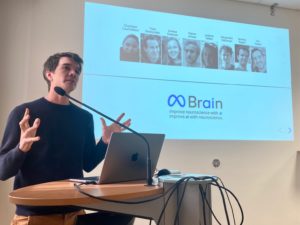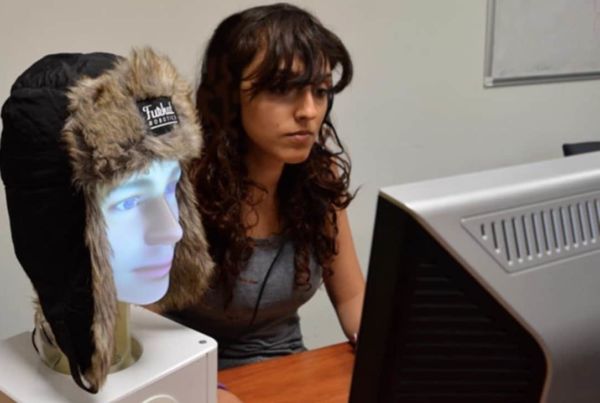|
Dear members of the ILCB community,
Over the past years, language development has become an increasingly important cross-cutting topic at the ILCB. After the creation of a very active project team on Computational Communication & Development (CoCoDev) in May 2020 and the acquisition of a fNIRS system for the new baby lab at St. Charles, I am pleased to announce that we just decided to create a new project team focused on the creation of an ILCB longitudinal language development corpus.
This project group will build on the work of Clément François and Laurent Prévot’s 80 PRIME grant (Ph.D. of Estelle Hervé presented at the annual retreat), Shreejata Gupta’s postdoc project (see portraits below) and Clément François’ ANR grant (PhD of Giulia Danielou) to create a unique corpus on early language development from birth to primary school. The corpus will feature recordings of infants’ linguistic environment, measures of neurodevelopment, electrophysiological recordings of auditory processing, eye movements in word learning tasks, gestural markers of emotion comprehension, and much more. Now that the ILCB is a permanent institute, we have a unique opportunity to follow children over a long period of time, and to create a dataset that could become a highly visible international reference to advance our understanding of normal and abnormal language development.
I was also very pleased by the great attendance at our first ILCB lunch talk of the year. The seminar featured a talk by Jean-Remi King (CNRS & Fundamental Artificial Intelligence Research, Meta) on Language in the brain and algorithms, followed by a lively afternoon session where Jean-Rémi King interacted with members of the ILCB PhD program presenting their research projects.

So, save the date for our next lunch talk by Olga KEPINSKA on November 18!
Best wishes
Johannes |
| |
|
" [...] un groupe de recherche qui marche, c'est un engrenage socialement institué de problèmes et de manières de les résoudre, un réseau de contrôles croisés, et, du même coup, tout un ensemble de productions qui, en dehors de toute imposition de normes, de toute orthodoxie théorique ou politique, ont un air de famille."
Pierre Bourdieu
in Questions de Sociologie (1984; Editions de Minuit; p. 52)
"[...] a research group that works is a socially established gear of problems and ways of solving them, a network of crossed controls, and, by the same token, a whole set of productions that, outside of any imposed norms, any theoretical or political orthodoxy, have an air de famille." |
| |
|
Conceptual alignment in a joint picture-naming task performed with a social robot |
|

To "align" during a conversation means for interlocutors to achieve similar mental representations of the communicative situation. Can conceptual alignement occur when one of the interlocutors is a robot? Twenty-four French native speakers took turns with a robot in naming images of objects belonging to different semantic categories. For a subset of those semantic categories, the robot was programmed to produce the superordinate, semantic category name (e.g., fruit) instead of the basic-level name associated with an object (e.g., pear). Over the course of the experiment, participants produced more superordinate names (e.g., saying 'fruit' to the picture of an apple) for objects in the semantic category named by the robot with a superordinate name. These observations reveal that participants align with the robot’s conceptual choices. So, yes, conceptual alignment affecting a speaker's word choices occurs as a result of adaptation to the partner, even when the partner is a robot.
Cirillo, G., Runnqvist, E., Strijkers, K., Nguyen, N., & Baus, C. (2022). Cognition, 227; 105213 -- @HAL
|
| |
|
Florence Bouhali
|
|
Florence Bouhali was awarded a 2022 ILCB post-doc fellowship to work with Johannes Ziegler (LPC) and Chotiga Pattamadilok (LPL), in collaboration with Fumiko Hoeft (UConn/UCSF). Her project will address the variability in the reading brain network across languages, individuals and contexts, to clarify how the size of… |
|
|
|
|
|
Margaux Lê
|
|
Margaux Lê was awarded a 2022 ILCB post-doc grant to conduct a project on rhythmic skills in dysgraphia with Marianne Jover (PsyClé), Aline Frey (LNC), and Jeremy Danna (LNC, CLLE). Margaux started to investigate rhythmic processing in children with neuro-developmental disorders (DCD and/or DD) with Jessica Tallet during… |
|
|
|
|
|
Shreejata Gupta (Diya)
|
|
Shreejata Gupta was awarded a 2022 ILCB Postdoctoral Fellowship. She will study how the perception and use of gestures by infants could be an excellent window to peek into their pre-verbal minds in order to understand early development of empathy. In collaboration with Isabelle Dautriche (LPC) and… |
|
|
|
|
| |
|
HIBOU: an eBook to improve Text Comprehension and Reading Fluency for Beginning Readers of French |
|
Ludivine Javourey, Drevet, Stéphane Dufau, Johannes C. Ziegler, & Núria Gala |
|
|
|
Are you Smiling When I am Speaking? |
|
Auriane Boudin, Roxane Bertrand, Magalie Ochs, Philippe Blache, & Stéphane Rauzy |
|
|
|
Two-Year-Olds’ Eye Movements Reflect Confidence in Their Understanding of Words |
|
Isabelle Dautriche, Louise Goupil, Kenny Smith, Hugh Rabagliati |
|
|
|
Typing expertise in a large student population |
|
Svetlana Pinet, Christelle Zielinski, F.-Xavier Alario, & Marieke Longcamp |
|
|
|
Inter‐individual variability in dorsal stream dynamics during word production |
|
Catherine Liégeois-Chauvel, Anne-Sophie Dubarry, Irene Wang, Patrick Chauvel, Jorge Gonzalez-Martinez, & F.‐Xavier Alario |
|
|
|
Age effect in expert cognitive flexibility in Guinea baboons (Papio papio) |
|
Julie Gullstrand, Nicolas Claidière, & Joel Fagot |
|
|
|
Probability matching is not the default decision making strategy in human and non-human primates |
|
Carmen Saldana, Nicolas Claidière, Joël Fagot, & Kenny Smith |
|
|
|
Magnetoencephalography can reveal deep brain network activities linked to memory processes |
|
Víctor López-Madrona, Samuel Medina Villalon, Jean‐michel Badier, Agnès Trébuchon, Velmurugan Jayabal, Fabrice Bartolomei, Romain Carron, Andrei Barborica, Serge Vulliémoz, F.‐Xavier Alario, & Christian Bénar |
|
|
| |
|
Une syntaxe domaine-général utile à la motricité et au langage, réplications.
|
|
Raphaël Py (LPC & LNC), Marie Montant (LPC), & Marie-Hélène Grosbras (LNC) |
|
|
| |
|
fNIRS and EEG training sessions |
| |
|
October 19th to 21st, Campus Saint-Charles |
| |
|
As you may know, ILCB has recently acquired a NIRS/EEG machine (Nirscout system, 16 optodes and 32 electrodes) which will be one of the spearheads of the future BabyLab in St Charles, “Le Labo des Minots”.
Very few laboratories in France, or in the world, are equipped with such a material. The strengths of the two techniques are combined, generating strong spatial but also temporal resolution.
Moreover, this type of equipment is perfectly adapted to the study of babies and young children. This is a great opportunity for the ILCB community and for Aix-Marseille University in general.
To better master the theoretical and methodological aspects of this cutting-edge technology, we propose a 2.5-day training course on the St. Charles campus, October 19th, 20th, and 21st, 2022.
We need to know how many people want to attend this training. Please contact Nadéra Bureau for further details and registration.
Clément François, Isabelle Dautriche, Nadéra Bureau |
| |
|
ILCB supports BrainHack Marseille 2022 |
| |
|
Researchers from a myriad of disciplines joining forces to work on collaborative and open-science neuroscience-related projects |
|
November 28th-30th at INT Faculté de Médecine, Marseille |
|
|
| |
|
ILCB supports Practical MEEG 2022 |
| |
|
An intensive three–day training to MEG and EEG data analyses |
|
From December 14th to 16th, create a full analysis pipeline with exemplar data in one of the four leading software dedicated to MEG and EEG analysis : Brainstorm, FieldTrip, EEGLAB, and MNE-python. |
|
|
| |
|
Please always check the events page on the ILCB website for the latest update. |
| |
|
fNIRS & EEG training sessions |
|
October 19-21 |
|
|
| |
|
Olga KEPINSKA, University of Vienna & University of Geneva |
|
November 18th 2022 @ 12:00 - 13:00 -- Typology of multilinguals’ languages and its relation to brain and cognition |
|
|
| |
|
Jean-Julien AUCOUTURIER, CNRS & IRCAM |
|
December 2nd 2022 @ 12:00 - 13:00 -- title TBA |
|
|
| |
|
Kate WATKINS, Oxford University |
|
February 3rd 2023 @ 12:00 - 13:00 --
title TBA
|
|
|
| |
|
Adeen FLINKER, New York University, New York |
|
March 10th 2023 @ 12:00 - 13:00 --
title TBA |
|
|
| |
|
Leonhard SCHILBACH, LVR-Klinikum, Düsseldorf |
|
April 14th 2023 @ 12:00 - 13:00 --
title TBA |
|
|
| |
|
Hélène LOEVENBRUCK, CNRS & Université Grenoble Alpes |
|
May 05th 2023 @ 12:00 - 13:00 --
title TBA |
|
|
| |
ILCB is affiliated to Aix-Marseille Université, CNRS, INSERM, and Université d'Avignon
5 avenue Pasteur 13604 Aix-en-Provence Cedex 1 B.P. 80975 +33 (0)4 13 55 36 31
Copyright © ILCB 2022
| |
|